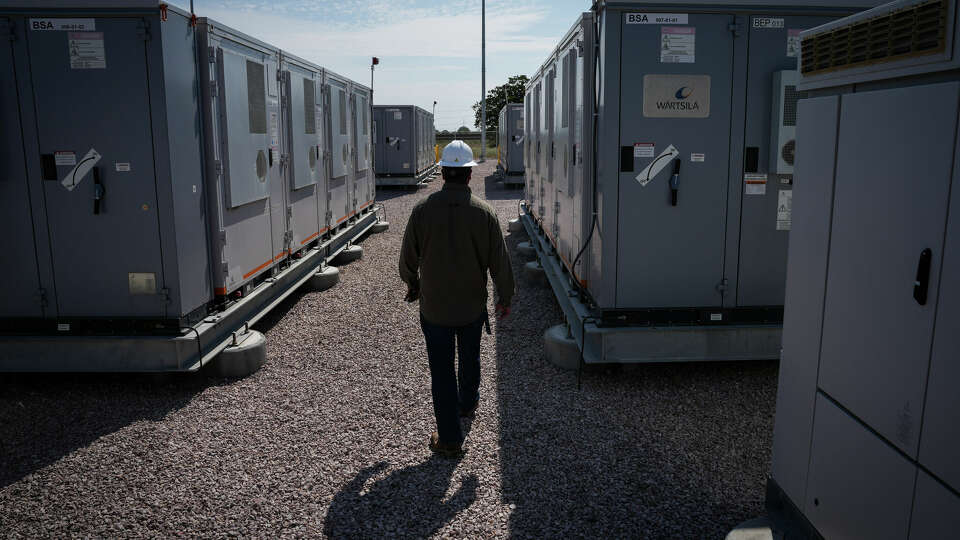
Photo by: Jon Shapley/Staff photographer
The state's utility regulator postponed a planned vote last week on rules for the burgeoning supply of batteries on the Texas power grid, writes reporter Sara DiNatale. The rules proposed by the Electric Reliability Council of Texas, the grid operator for 90% of Texas, would penalize battery operators if the charge in their batteries falls below an ERCOT-set threshold.
Those who take issues with the rules, including some members of the Public Utility Commission of Texas, say that they would unfairly punish battery operators for falling below a certain charge even before they actually fail to deliver the amount of power they pledged to the grid. Battery operators say they would be more cautious about providing power to the state's grid, even in times when the grid needs power the most.
ERCOT says the rules help the grid operator accurately gauge how much power is available from batteries, a new technology that it is still learning how to navigate. The rules are a transitory measure and will provide greater transparency, the grid operator said.
The rules require approval from a majority of commissioners before they go into effect. They represent continuing debate about how the fast-growing fleet of batteries in Texas can contribute to the stability of the power grid. If ERCOT hadn't had the amount of batteries that it did during the September grid emergency, ERCOT would've likely had to institute rotating outages to prevent the grid from collapsing, according to one commissioner.
More energy news

Photo by: Photo Courtesy Of The United States Coast Guard
A 67-mile pipeline operated by Houston-based Third Coast Infrastructure, believed to be the source of the spill, has been shut down.
 Photo by: Gary Tramontina/Corbis Via Getty Images | | Oil companies say they might explore options outside the Gulf after the Biden administration said it would scale back leasing. | |
 Photo by: Jon Shapley, Staff Photographer | | Elliott in the past few weeks has set its sights on the management of NRG Energy and Crown Castle. | |
 Photo by: Courtesy | | McAdams was appointed by Gov. Abbott in April 2021 in an overhaul of the PUCT after Winter Storm Uri. | |
 Photo by: Karen Warren, Staff Photographer | | Houston-based company's carbon capture tech at Petra Nova was at the forefront of a new industry. | |
 Photo by: NITASHIA JOHNSON, STR / NYT | | Dire warning about possible electricity shortage does not reflect financial and political incentives to keep the heat on. | |
 Photo by: Michael Wyke, Contributor | | Occidental is likely sizing up CrownRock's prized Permian acreage, but its Anadarko purchase could cloud the deal. | |
 Photo by: Hollie Adams, Bloomberg | | Big Oil wants U.N. climate talks to guarantee their future, while many leaders want to end dependence on fossil fuels. | |
 Photo by: Hollie Adams, Bloomberg | | Leaders of more than 100 nations are calling for an end to investments in new production of oil, natural gas and coal. | |
 Photo by: Elaine Thompson, Associated Press | | Efforts by Congress to spur the revival of nuclear energy face increasing uncertainty. | |
 Photo by: Elizabeth Conley/Staff Photographer | | As winter approaches, the Texas oil and gas industry is preparing its facilities for extreme weather. | |
 Photo by: Josie Norris, San Antonio Express-News / Staff Photographer | | Electrified vehicle sales surpassed one-third of the total for the first time with help from San Antonio-made hybrid Tundra pickups and Sequoia SUVs. | |

Photo by: Fuel Fix
What We're Reading
As countries clean up their power plants and cars, emissions from heavy industry are now on pace to become by far the world's largest source of greenhouse gases, the New York Times reports.


















No comments:
Post a Comment